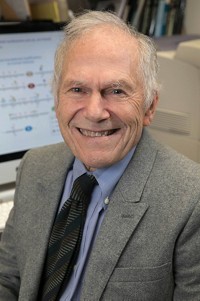Advertisement
Grab your lab coat. Let's get started
Welcome!
Welcome!
Create an account below to get 6 C&EN articles per month, receive newsletters and more - all free.
It seems this is your first time logging in online. Please enter the following information to continue.
As an ACS member you automatically get access to this site. All we need is few more details to create your reading experience.
Not you? Sign in with a different account.
Not you? Sign in with a different account.
ERROR 1
ERROR 1
ERROR 2
ERROR 2
ERROR 2
ERROR 2
ERROR 2
Password and Confirm password must match.
If you have an ACS member number, please enter it here so we can link this account to your membership. (optional)
ERROR 2
ACS values your privacy. By submitting your information, you are gaining access to C&EN and subscribing to our weekly newsletter. We use the information you provide to make your reading experience better, and we will never sell your data to third party members.
Biological Chemistry
2008 Lasker Awards Announced
by Linda Wang
September 29, 2008
| A version of this story appeared in
Volume 86, Issue 39
FIVE INTERNATIONAL scientists received the 2008 Lasker Awards, given by the Albert & Mary Lasker Foundation, at a ceremony on Sept. 26 in New York City.
Each award carries a $300,000 honorarium, shared equally among the recipients of each award, and an inscribed statuette of the Winged Victory of Samothrace. In the past two decades, 27 Lasker Award recipients have subsequently received a Nobel Prize.
Victor R. Ambros, 54, at the University of Massachusetts Medical School, in Worcester; David C. Baulcombe, 56, at the University of Cambridge; and Gary B. Ruvkun, 56, of Massachusetts General Hospital and Harvard Medical School, will share the Lasker Award for Basic Medical Research for their roles in the discovery of microRNAs, which are small RNA molecules that regulate gene function. Initially discovered in worms, microRNAs have subsequently been found in many other types of organisms. These molecules revealed an unanticipated role for RNA that scientists now are investigating for therapeutic applications.
The Lasker-DeBakey Award for Clinical Medical Research honors Akira Endo, 74, of Biopharm Research Laboratories, in Tokyo, for the discovery of mevastatin, also called compactin, the first compound in the class of drugs known as statins. Statins reduce the levels of "bad" cholesterol (low-density lipoprotein) in blood without affecting the levels of "good" cholesterol (high-density lipoprotein). In 1979, Endo showed that mevastatin lowers blood cholesterol in dogs and monkeys. Because of side effects, mevastatin has never been used clinically, but its discovery helped lead to safer cholesterol-control agents.
Stanley Falkow, 74, a microbiologist at the Stanford University School of Medicine, received the biennial Lasker-Koshland Award for Special Achievement in Medical Science. The lifetime achievement award honors his contributions to the understanding of disease-causing microbes, particularly in the area of antibiotic resistance.
Linda Wang compiles this section. Announcements of awards may be sent to l_wang@acs.org









Join the conversation
Contact the reporter
Submit a Letter to the Editor for publication
Engage with us on Twitter